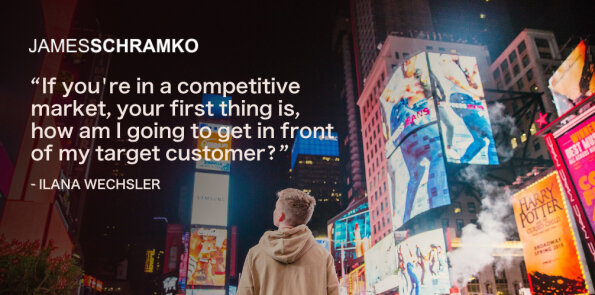If you want your business to thrive, you need to stand out from the crowd. One way you can do this is by targeting a hyper niche market.
TeachTraffic’s Ilana Wechsler shares three steps for getting the traffic you need in this area, without breaking the bank.
Podcast: Download (Duration: 32:44 — 33.7MB)
Get Notified Of Future Episodes Apple Podcasts | Spotify | Amazon Music | Android | Blubrry | Gaana | TuneIn | Deezer | Anghami | RSS | More
When you’re in a hyper niche, competitive market, getting paid website traffic, especially on a limited budget, can be a challenge. That’s not to say it can’t be done.
TeachTraffic’s Ilana Wechsler will help you decide which platform is more appropriate for your ads.
She’ll discuss three important things you need to consider with your advertising.
She’ll also recommend the sniper approach to paid ads as opposed to going in with a shotgun method.
Table of contents
1. When you have a small budget in a competitive market….
2. Will it be Facebook, or Google?
3. Sometimes, it’s just about getting going
4. Ilana’s three steps to compete
-
A. Good targeting
B. A good offer
C. A good creative
5. This is where you think like a sniper
- A. Just 10 specific videos
B. What’s ranking organically?
C. Hyper-relevancy
D. Showing ads to your customers
E. Profile building
When you have a small budget in a competitive market…
Ilana Wechsler knows every market is competitive. And unless you have a really large budget, it can be really hard and daunting in order to know where and how to compete.
The good news is, you don’t need to do everything to succeed. And maybe you do end up doing everything, but you start small, in a very calculated and strategic way.
Ilana’s goal is to help people critically analyze how they can grow and scale from something little so they don’t have to burn a large amount of budget. And she achieves that by focusing on three elements:
– Good targeting
– A good offer
– A good creative
With that and a sniper mindset, you can go a long way on limited resources.
Will it be Facebook, or Google?
In paid traffic, people generally pick from two major platforms – Facebook or Google. What’s the difference?
Google, first of all, is much bigger than most people realize, and it’s composed of four main parts. First is Google search – we’ve all typed in a query and seen the text ads above the results.
Another part of Google ads is the Google Display Network, which is showing ads on other people’s websites – typically publisher websites such as the Sydney Morning Herald, or in the US, the New York Times – over two million websites.
The third bucket is YouTube, where the most common ad is the instream ads that show up before videos. And the fourth part is Google Shopping, those image ads with the price just under – purely for people who sell physical products.
If you have an e-commerce store, or a product or service you can swipe in front of someone at the moment they’re looking to buy, Google is a perfect place to start placing ads.
Facebook may be a better option if you’re looking to go viral with something, or if you have a product people aren’t typically searching for. If you sell something people don’t really know exist yet, Facebook ads are a great way to create demand.
Sometimes, it’s just about getting going
So which should you begin with?
Sometimes, it’s just about starting and pivoting from there. What you start doing and what you end up doing can often look quite different. But you never would have known that you’d end up there if you hadn’t started at that initial point, says Ilana.
Ilana’s three steps to compete
Essentially, for any kind of business, online success comes down to good targeting, a good offer, and a good creative.
Good targeting
If you’re in a competitive market, your first thing is, how am I going to get in front of my target customer?
Typing a related inquiry into Google will reveal several things: whether there is an audience for your type of product, whether anyone else has Google search ads for the keyword you used (if there’s none, Ilana doesn’t recommend advertising yourself), and where would be a good place to put ads for related keywords – YouTube, for instance, if you find a good number of your audience on that channel.
A good offer
When you’ve got your targeting down, you can test your offer. If you’ve got the right audience but your ad isn’t getting clicks, it could be your offer isn’t compelling. Fix that instead of changing your targeting.
A good creative
Again before changing your targeting, consider tweaking your creative. Test different versions to see what works.
This is where you think like a sniper
How do you know your targeting’s correct? By taking the sniper approach. The sniper approach really eliminates the variable of, have I got the right targeting? Because we are nailing our targeting.
Just 10 specific videos
Take, say, 10 YouTube videos to put your ad in front of – you don’t even have to go to a channel, you can go to a specific video in a channel and advertise just on those. That is the perfect way to start to test your offer and your creative.
What’s ranking organically?
Another thing you can do on Google is, in the absence of ads, see what’s ranking organically – check out who’s ranking one, two, three for a keyword, go to their websites, and see if they allow Google ads. If they do, great – you can also be a sniper on the Google Display Network.
Hyper-relevancy
In addition, you can get hyper-relevant with your keywords, going with long tail keywords and seeing who allows Google ads for those.
Showing ads to your customers
Another smart sniper approach is intentionally showing ads to your customers. First, it makes you look big; second, customers who love you can comment on the ads, saying how awesome you are – it’s a great way to get social proof.
Profile building
One more thing that’s worked for Ilana and her clients is targeting big business type websites and doing a better placement on them, in regions where they want to get in front of a certain demographic.
There are many ways, says Ilana, that you can think like a sniper in your industry. So for listeners, she recommends, imagine that you are your target customer, what would you do as a starting point to get in front of them?
If you want more of Ilana, drop by TeachTraffic.com. In particular, check out her Paid Traffic Puzzle, a presentation that goes through her whole targeting framework, at TeachTraffic.com/puzzle.
Join the community of thriving entrepreneurs inside the James Schramko membership
Liked the show? Enjoy all the episodes when you subscribe on iTunes













Ilana Wechsler is still doing great things. Nice to see her and you both again!